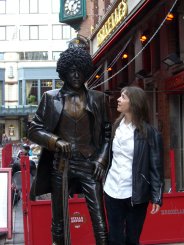

A sustainable career in writing
I notice that JA Konrath has a New Year’s Resolution thread on his blog: A Newbie’s Guide to Publishing. It’s not often I disagree with JA, but I have something of a hatred of the ‘resolution’ process and its results.
The main reason for this is that I’ve been lucky (or unlucky) enough to have three careers, only the last of which is a sustainable one, and I wish more people could be brought to understand that one of the keys to working happiness is not achievement; not ‘success’ (whatever that may be); not income; not promotion – it’s sustainability.
1. My first career was as a model. It means you are aware, from day one, of your short shelf life. Many young women (and increasingly, young men) develop behaviours designed to try and extend that shelf life. Those behaviours almost never work, but they do wreck health, relationships and bank balances. From bulimia to botox, they are ways of denying the reality of your physical being and that means denying your own, absolute reality. It’s not surprising models are neurotic, it’s actually surprising more of them aren’t suicidal, given the way the industry works.
2. My second career (don’t ask how I got from 1. – 2. it’s too long and boring a story) was running international think tanks. Charity work seems to many like a great thing to do. It is. But at the top, it kills. It kills with stress, guilt, unlimited demands on your time and temper and intellect and the knowledge that no matter how much you do, you can never, ever do enough. A great charity CEO and thinker, Nicholas Hinton, died in his fifties of a heart attack while I was running my first charity – and I do believe that the incredible pressure of leading a world class charity contributed to his untimely and much lamented death. Those pressures are exacerbated if, like me, you have to travel the world for the job. I had: bleeding stomach ulcers, pneumonia, three kinds of tropical fever, septicaemia and finally some kind of ME, before I finally realised the job was going to kill me too.
3. Writing is my third career. On Friday I shall do my annual summing up and see how many stories I subbed this year, how many got published, how many got rejected etc – and it’s always a bit of a shock to me. But the goals I set are very simple and I always meet them. They are:
• To earn a living from writing fiction
• Never to ignore my instincts when assessing a proposal or project
• To enjoy what I do every day
• Not to worry about my reputation or progress
That’s it. Nothing more, but also, nothing less. No grandiose ideas about writing a bestseller or winning the Booker, but no self-defeating cudgels to beat myself with either, like writing every day or having seventeen submissions out at once. Of course, every one of these goals has sub-goals: to earn a living from fiction I do need to have a lot of submissions out there at once, but I haven’t got a predetermined number of them in my head – I just sit down every Friday lunchtime and if I haven’t sent out around five pieces, I scour the markets until I find five places to send stuff to. And that means having quite a few more than five pieces of work ready to go out at any given time … but I don’t say that I must complete thirteen, or thirty, or three hundred stories a year (I’ll tell you on Friday how many I did complete because I don’t know myself!).
The second and third goals help me to remember that I’m supposed to enjoy every day, not just the pay cheque, so if an editor gives me a bad vibe, or somebody wants me to write an article that I’m not happy with, or a review for a book I didn’t enjoy I just say no. Why suffer even for an hour if I can be happy? Most of those folk will be happy with some kind of counter proposal and that makes both of us happy …
And the point is …?
The point is, when setting goals, make them as much about what sustains you as what you want to achieve. That way you’ll always be working towards your own wellbeing, as well as your desired success.
PS – that’s me with a man whose career was not sustainable; the wonderful but short-lived Phil Lynnot, who statue in Dublin is a reminder that sustainability really does matter, even for the most successful and wonderful people.


4 Comments
Nik's Blog
26th December 2007Great post, Kay.
All the very best for ’08.
Nik.
katrina
26th December 2007You are a wise and fascinating woman, Kay.
Jim Murdoch
27th December 2007No, I’ve never been one for resolutions but it is that time of year. That doesn’t mean I don’t have goals but they’re always short-term. I pretty much know what I want to achieve over the next six months; some I will (because I’m in control) whereas others I may not (depending on who else the gods happen to have in their lap).
An annual assessment of what we’ve managed over the past year is probably a better idea because there we’re dealing with absolutes. I’ve never coped very well setting goals; I simply do my best and, of course, as I’m getting older I’m finding I’m not as capable as I once was so trying to achieve what I know I used to be able to do with ease can only bring disappointment.
If I have a continuing resolution it would be to remember that I am a writer first and foremost, it’s not a hobby and, although it may never pay my bills, it’s who I am. I don’t need to work sixty hours a week and try and write in the cracks and I’m not going to.
Kay Sexton
28th December 2007Very perceptive thoughts, Jim. Especially the one about looking back, which not enough people really do, writers or otherwise!